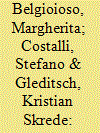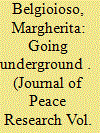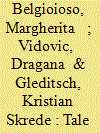| Srl | Item |
| 1 |
ID:
178935


|
|
|
|
|
| Summary/Abstract |
Fringe terrorism is common during nonviolent campaigns. We examine how this can modify the strategic environment between dissident groups and the state in ways that present both challenges and opportunities to moderate factions. Terrorism is intended to promote violent escalation in a conflict, but we argue that fringe terrorist activities in a nonviolent campaign under certain conditions can induce an advantage for well-organized moderate factions. The risk of escalation following terrorism can give the government more incentives to offer concessions to moderate campaign leaders if the movement can credibly prevent armed escalation. The ability to control and prevent violence is more likely when nonviolent movements have a hierarchical structure and a centralized leadership, as such campaigns are better able to prevent shifts by supporters towards violent fringes. Using new data on terrorist attacks by factions sharing the same overall objectives as ongoing nonviolent campaigns, we show that nonviolent campaigns are more likely to see substantial gains in spite of fringe terrorist activities when a movement has a hierarchical structure and a centralized leadership.
|
|
|
|
|
|
|
|
|
|
|
|
|
|
|
|
| 2 |
ID:
196024


|
|
|
|
|
| Summary/Abstract |
This study proposes an organizational mechanism that links ideology to the use of terrorism in mass dissident campaigns. Ideology affects the level of competition among factions within mass dissident campaigns by shaping whether actors see their interactions as a positive- or zero-sum game. We identify ideological diversity within a campaign and the degree to which ideologies embrace the principle of pluralism as key factors affecting the intensity of factional competition and, consequently, the occurrence of terrorism. We introduce new data on the ideologies of campaigns from the Nonviolent and Violent Campaigns and Outcomes 2.0 dataset and use causal mediation analysis to test our proposed mechanism. We find that greater ideological diversity within a campaign increases the likelihood of terrorism by increasing factional competition. We also find that the presence of a pluralist ideology is associated with a lower likelihood of terrorism by the lowering of factional competition. By shedding light on the mechanisms that link ideology to terrorism, this study helps advance our understanding of why dissident groups might decide to use terrorism tactics within the context of a campaign of mass resistance.
|
|
|
|
|
|
|
|
|
|
|
|
|
|
|
|
| 3 |
ID:
161553


|
|
|
|
|
| Summary/Abstract |
When and why do groups participating in mass dissent choose to initiate terrorist campaigns? I argue that groups involved in civil wars and mass civil resistance might face similar organizational pressures, which encourage the initiation of terrorism due to higher tactical effectiveness. Internal organizational pressure might depend on leaders’ expectations of a decline in followers’ commitment with protracted use of mass tactics. This is likely to motivate leaders to initiate terrorist campaigns to secure organizational survival. External organizational pressures might depend on increasing dissident campaigns’ fragmentation. This intensifies competition making leaders more likely to initiate terrorism so as to establish themselves at the forefront of their movements. The findings provide empirical support consistent with my claims and indicate no significant difference between civil wars and mass civil resistance movements with regards to these effects. Contrary to the common idea that the use of conventional violence should entail a higher willingness to engage in illegal violence against non-combatants, this finding suggests that conflict dynamics affect the decision to initiate terrorism and that terrorist campaigns have a coherent strategic logic across different types of mass dissent.
|
|
|
|
|
|
|
|
|
|
|
|
|
|
|
|
| 4 |
ID:
160476


|
|
|
|
|
| Summary/Abstract |
Bosnia and Herzegovina (BiH) experienced an unprecedented wave of nonsectarian antigovernment protests in 2014. Although the key motivating factors generally highlighted, such as economic marginalization and poor governance, were common throughout Bosnia and Herzegovina, the protests did not extend to all parts of the country. Notably, despite very similar initial conditions in the two jurisdictions of the country, the Federation of Bosnia and Herzegovina (FBiH) saw major unrest with a large number of participants in many locations while subsequent protest mobilization was much more limited in the Republic of Srpska (RS). We take advantage of the variation in the responses from the two governments in the same country to evaluate how observed and anticipated government responses can shape the willingness to join dissident activity. We argue that variation in government responses and its impact on perceptions of prospects for successful collective action can help account for the differences in mobilization across the two entities. We test our expectations using a new data set on protest events, participants, and government responses in BiH from January to April 2014. Our findings are consistent with the argument that coherent repressive government policies tend to suppress mobilization, while mixes of repressive responses and concessions from the government can encourage further mobilization. The results for FBiH show clear variation in protest following changes in government behavior and are consistent with the claim that repressive responses likely suppressed mobilization in the RS.
|
|
|
|
|
|
|
|
|
|
|
|
|
|
|
|